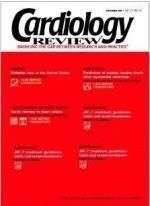Fasting glucose linked to CHF in older diabetic patients
Elevated fasting glucose levels in older adults with diabetes increase the risk for congestive heart failure (CHF). This risk is more apparent in the presence of coronary heart disease (CHD), according to Joshua Barzilay, MD, and colleagues.
As reported in the Journal of the American College of Cardiology (2004;
43[12]:2236-2241), they followed 829 diabetic persons aged 65 years or older who participated in the Cardiovascular Health Study, a longitudinal trial that sought to identify factors related to cardiovascular disease and stroke. Diabetes was defined as a fasting glucose of 126 mg/dL or greater, or the use of antidiabetic agents. Of the 829 subjects in this study, 626 were without clinical CHD and 203 had clinical CHD at baseline.
In a previous analysis of the Cardiovascular Health Study, a history of diabetes predicted CHF, but a fasting glucose level above 125 mg/dL did not.
Findings in persons without CHD at baseline. Among those without CHD at baseline, there were 123 CHF events (31.1 cases per 1,000 person-years) during the follow-up of 5 to 8 years. Those who developed CHF were older and had greater central obesity; they also had higher systolic blood pressure, fasting glucose, uric acid, and C-reactive protein levels compared with those who did not develop CHF. Of those hospitalized for CHF, left ventricular function was preserved in more than half.
When fasting glucose levels were divided into quartiles, the CHF rate was found to nearly double among persons whose fasting glucose levels were in the second or third quartiles compared with the first quartile, and it tripled among those with fasting glucose levels in the highest quartile compared with the lowest quartile, reported Dr. Barzilay, associate clinical professor of medicine, Kaiser Permanente of Georgia, Emory University School of Medicine, Atlanta. For every 60.6-mg/dL increase in fasting glucose (one standard deviation), the risk of CHF increased by 41% among the participants without CHD at baseline.
Findings in persons with CHD at baseline. Among the 203 participants with CHD at baseline, there were 83 incident CHF events during follow-up (78.3 per 1,000 person-years). In this group, CHF risk increased by 27% for every 60.6-mg/dL increase in fasting glucose.
Potential mechanisms. Several mechanisms may explain the increased risk of CHF with raised glucose levels, according to Dr. Barzilay. Raised levels of fasting glucose may be a result of poor compliance with medicines or poor medical care, although the use of hypoglycemic agents was similar in persons who did and did not develop CHF in this study. Hyperglycemia may also impair endothelial function and vasodilation. Third, elevated glucose levels may lead to myocardial fibrosis and stiffness with diminished diastolic filling. This final potential mechanism is supported by the finding that most of the participants in this study with CHF had normal or only borderline impairment of systolic function.
